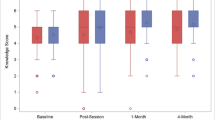Abstract
Background. African American (AA) men continue to have a greater than twofold risk of dying from prostate cancer compared to Whites. Methods. This community-based intervention study employed a quasi-experimental, delayed-control (cross-over) design with randomization at the church-level (N=345 AA men). Results. Logistic regression analyses revealed that the level of knowledge (b=.61, P<.05, Exp (B)=1.84), the perception of risk (b=2.99, P<.01, Exp (B)=19.95), and having insurance (b=3.20, P<.01, Exp (B)=24.65) significantly increased the odds of participants who needed screening getting screened during study. Discussion. This study demonstrated the need for education, community involvement, and increased access to encourage minority men to obtain needed health screenings.
Similar content being viewed by others
References
American Cancer Society. Cancer Facts and Figures 2007. Atlanta, GA: American Cancer Society; 2007.
Ries LAG, Melbert D, Krapcho M, et al., eds. SEER Cancer Statistics Review, 1975–2004. Bethesda, MD: National Cancer Institute. Available at: http://seer.cancer.gov/csr/1975-2004/. Accessed June 7, 2007.
Xiao H, Gwede CK, Kiros G, Milla K. Analysis of prostate cancer incidence using geographic information system and multilevel modeling. J Natl Med Assoc. 2007;99:218–225.
Oakley-Girvan I, Kolonel LN, Gallagher RP, et al. Stage at diagnosis and survival in a multiethnic cohort of prostate cancer. Am J Public Health. 2003;93:1753–1759.
Denberg TD, Kim FJ, Flanigan RC, et al. The influence of patient race and social vulnerability on urologist treatment recommendations in localized prostate carcinoma. Med Care. 2006;44:1137–1141.
Underwood W, de Monner S, Ubel P, et al. Racial/ethnic disparities in the treatment of localizes/regional prostate cancer. J Urol. 2004;171:1504–1507.
Underwood W, Jackson J, Wei JT, et al. Racial treatment trends in localized/regional prostate carcinoma: 1992–1999. Cancer. 2005;103:538–545.
Weinrich SP. Interventions to increase prostate cancer screening. National Cancer Institute Grant #1-RO1-CA60561-01. Bethesda MD: National Institutes of Health; 1994.
Champion V. Instrument development for health belief model constructs. ANS Adv Nurs Sci. 1984;6:73–85.
National Center for Chronic Disease Prevention & Health Promotion. Behavioral risk factor surveillance system 2006. Available at: http:// apps.nccd.cdc.gov/brfss. Accessed June 19, 2007.
Gilligan T, Wang PS, Levin R, et al. Racial differences in screening for prostate cancer in the elderly. Arch Intern Med. 2004;164:1858–1865.
Pan CC, Lee JS, Sandler HM, et al. The association between presentation PSA and race in two sequential time periods in prostate cancer patients seen at a university hospital and its community affiliates. Int J Radiat Oncol Biol Phys. 2003;57:1292–1296.
Moul JW. Population screening for prostate cancer and emerging concepts for young men. Clin Prostate Cancer. 2003;2:87–97.
Thompson I, Tangen C, Tolcher A, et al. Association of African-American ethnic background with survival in men with metastatic prostate cancer. J Natl Cancer Inst. 2001;93:219–225.
Underwood W, Wei J, Rubin MA, et al. Postprostatectomy cancer-free survival African Americans is similar to non-African Americans after adjustment for baseline cancer severity. Urol Oncol. 2004;22:20–24.
Ayanian J, Weissman J, Schneider E, et al. Unmet health needs of uninsured adults in the United States. JAMA. 2000;284:2061–2069.
Meissner H, Smith R, Rimer B, et al. Promoting cancer screening: learning from experience. Cancer. 2004;101:1107–1117.
Terris MK, Ruff PA, Marotte JB. Primary care providers' attitudes toward prostate cancer risk factors at a Veterans Affairs health care facility. Mil Med. 2005;170:154–157.
Carlos RC, Underwood W, Fendrick AM, et al. Behavioral associations between prostate and colon cancer screening. J Am Coll Surg. 2005;200:216–223.
Conlisk EA, Lengerich EJ, Demark-Wahnefried W, et al. Prostate cancer: demographics and behavioral correlates of stage at diagnosis among blacks and whites in North Carolina. Urology. 1999;53:1194–1199.
Hoffman RM, Stone SN, Espey D, et al. Differences between men with screening-detected versus clinically diagnosed prostate cancers in the USA. BMC Cancer. 2005;5:2407–2416.
Tannor BB, Ross L. Physician-patient discussions about prostatespecific antigen test use among African-American men. J Natl Med Assoc. 2006;98:532–538.
Odedina FT, Scrivens J, Emanuel A, et al. A focus group study of factors influencing African-American men's prostate cancer screening behavior. J Natl Med Assoc. 2004;96:780–788.
Rosenstock IM. Historical origins of the health belief model. Health Educ Monogr. 1974;2:328–335.
Rosentstock IM. The health belief model: Explaining health behavior through expectancies. In:Glanz K, Lewis F, Rimer B, eds. Health Behavior and Education. San Francisco: Jossey-Bass Publishers; 1990:39–63.
Pauly MV, Pagan JA. Spillovers and vulnerability: the case of community uninsurance. Health Affairs. 2007;26:1304–1314.
Author information
Authors and Affiliations
Corresponding author
Additional information
Supported by Centers for Medicare and Medicaid Services Grant No. 20-P-91879/4-02 to Tennessee State University, Baqar A. Husaini, Principal Investigator.
Rights and permissions
About this article
Cite this article
Emerson, J.S., Reece, M.C., Levine, R.S. et al. Predictors of new screening for African American men participating in a prostate cancer educational program. J Canc Educ 24, 341–345 (2009). https://doi.org/10.1080/08858190902854749
Issue Date:
DOI: https://doi.org/10.1080/08858190902854749




